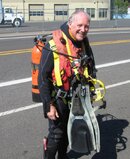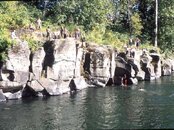DivingFirefighter
Registered
I feel your pain about the lack of dive buddies!! but...
Here is my two cents, I've been a firefighter for 13 years. I agree that some people are capable of solo diving. I haven't done it personally, yet, but I may in the future. My concern that I would express to the OP is that in firefighting you have more options for self-rescue, there is a warning system built in to most SCBAs that is hard to ignore for low air. With SCUBA diving, if you have a low on air or out of air situation, the options are pretty limited. My suggestion to the OP is pay to dive with the dive shops 3 or 4 times, be very out going and meet some new people. I had to perform an exercise recently for my Divemaster cert that really showed me how quickly and easily it is to find yourself starting to panic, and I consider myself to be fairly confident and competent diver.
As for everyone else, I think a lot of people are concerned about government intervention in dive training and diving in general, due to potential increased accident rates from solo diving. I have no problem with people who choose to solo dive, just please for your family, friends and the sake of the rest of diving community PLEASE do it safely and responsibly!
Here is my two cents, I've been a firefighter for 13 years. I agree that some people are capable of solo diving. I haven't done it personally, yet, but I may in the future. My concern that I would express to the OP is that in firefighting you have more options for self-rescue, there is a warning system built in to most SCBAs that is hard to ignore for low air. With SCUBA diving, if you have a low on air or out of air situation, the options are pretty limited. My suggestion to the OP is pay to dive with the dive shops 3 or 4 times, be very out going and meet some new people. I had to perform an exercise recently for my Divemaster cert that really showed me how quickly and easily it is to find yourself starting to panic, and I consider myself to be fairly confident and competent diver.
As for everyone else, I think a lot of people are concerned about government intervention in dive training and diving in general, due to potential increased accident rates from solo diving. I have no problem with people who choose to solo dive, just please for your family, friends and the sake of the rest of diving community PLEASE do it safely and responsibly!






